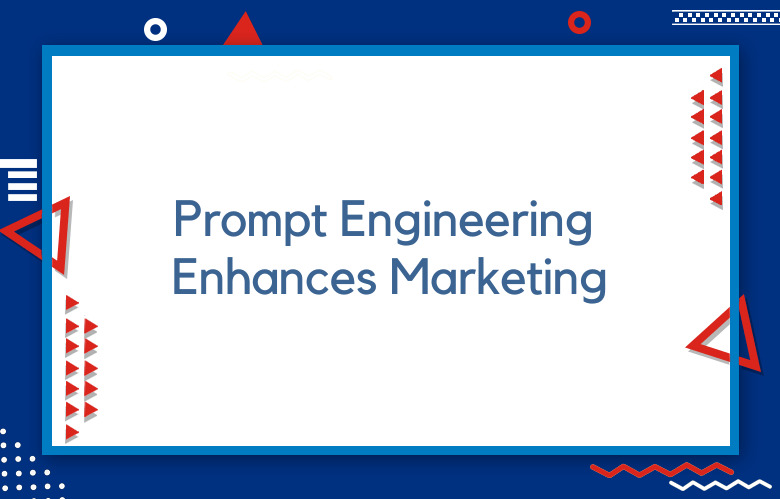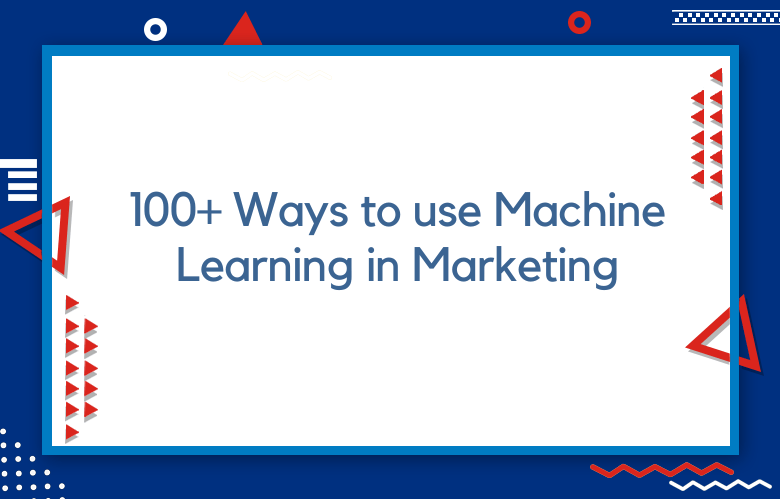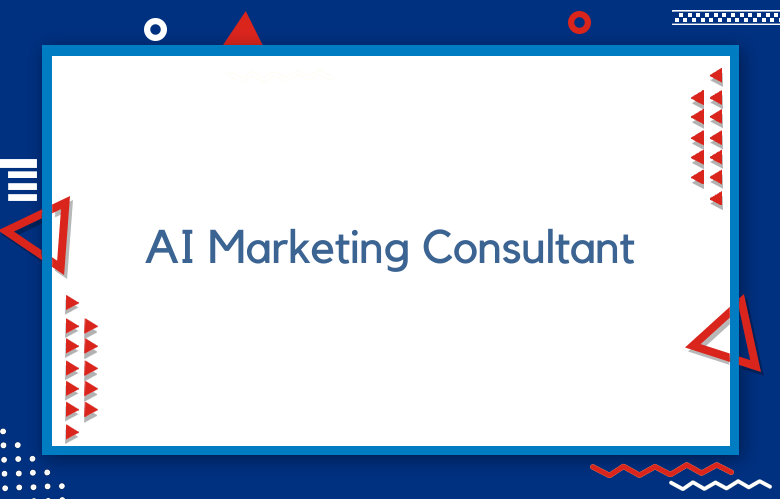How AI Prompt Engineering Enhances Marketing and Automation?

Technological advancements have paved the way for businesses to be more efficient, and automation is a significant step forward. With AI prompt engineering, enterprises are adopting new and advanced ways to enhance their marketing strategies and automate everyday tasks.
AI prompt engineering is a powerful tool that utilizes natural language processing to understand and respond to queries. We will explore how AI fast engineering enhances marketing strategies and streames automation processes.
Artificial intelligence (AI) has changed the business landscape across different industries. One area where AI is having a significant impact is marketing and automation.
With AI prompt engineering, businesses can collect and process large amounts of data to make informed decisions, automate tedious tasks, and improve customer experience. This paper explores how AI prompt engineering enhances marketing and automation.
Enhancing Marketing with AI Prompts
AI, or Artificial Intelligence, is transforming the marketing industry in numerous ways. With the abundance of data available at everyone’s fingertips in today’s digital age, it has become increasingly complex and time-consuming for marketers to sift through it all and accurately analyze and interpret it.
This is where AI comes in, as it can quickly and efficiently analyze vast amounts of data to provide marketers with valuable insights and predictions.
One way in which AI is enhancing marketing is through the use of chatbots. Chatbots can interact with customers 24/7, answering questions and providing real-time solutions.
This saves businesses money by reducing the need for human customer service representatives and provides customers with a convenient and efficient way to get their questions answered and problems solved.
The Power of AI Prompt Engineering
As technology advances at an unprecedented pace, artificial intelligence (AI) has emerged as a potent tool transforming virtually every aspect of our lives, from business and industry to healthcare and education.
With its ability to process vast amounts of data at lightning speeds, AI can identify patterns and insights beyond human capabilities, allowing us to make better decisions and achieve unimaginable outcomes.
One key factor driving AI’s power is the development of prompt engineering. This cutting-edge approach focuses on creating AI models to generate human-like responses to prompts and queries.
With prompt engineering, AI systems can be trained to understand natural language and respond with nuanced, context-sensitive answers tailored to each user.
Boosting Marketing and Automation with AI Prompts
Marketing and automation are two crucial components of any successful business operation. However, in today’s hyper-competitive market, more than simply having these tools is required.
Enter Artificial Intelligence (AI). By harnessing the power of AI prompts, businesses can take their marketing and automation efforts to the next level.
AI prompts are machine learning technology that utilizes algorithms and data to make intelligent marketing decisions.
These prompts can take various forms, from personalized email campaigns to chatbots on a company website. Regardless of the application, AI prompts are designed to deliver customized content in real-time, building brand loyalty and engagement.
How AI Prompt Engineering Enhances Marketing
Artificial Intelligence (AI) prompt engineering is poised to enhance marketing significantly.
With the vast amount of data generated by the modern digital landscape, AI prompt engineering offers marketers the ability to collect, analyze, and use data to make more informed decisions and understand customer needs and behavior.
AI prompt engineering helps marketing teams to analyze data much faster and more accurately than human analysts, thus enabling companies to gain valuable insights into their target audience.
By leveraging AI-powered technologies like natural language processing (NLP), machine learning, and predictive analytics, marketing teams can more effectively segment their audience and offer personalized experiences that resonate with customers.
Leveraging AI Prompts for Marketing Success
As the world increasingly digitizes, businesses turn to innovative technologies such as Artificial Intelligence (AI) to gain an edge over the competition.
AI has been particularly useful in marketing, revolutionizing how businesses interact with customers. AI prompts are one such tool that has proven incredibly valuable for marketers, enabling them to improve customer engagement, drive sales, and boost profitability.
AI prompts are pre-written messages triggered by specific customer actions or behaviors. They can take many forms, from simple welcome messages to complex product recommendations and personalized offers.
By leveraging AI prompts, businesses can deliver customized content to their customers at the right time and place, increasing the likelihood of conversion and creating a more positive customer experience.
How Prompt Engineering Enhances Marketing and Automation
Prompt engineering is a critical component that has become increasingly essential for businesses in enhancing marketing and automation processes. Fast engineering revolves around designing and creating clear, concise messages tailored to customers’ needs and preferences.
With this approach, companies can improve the effectiveness and efficiency of their marketing and automation techniques, which ultimately translates into higher levels of profitability and customer satisfaction.
One of the critical benefits of prompt engineering is that it enables businesses to generate more impactful and persuasive marketing messages that are likely to resonate with customers.
Through carefully crafted prompts and call-to-actions, companies can encourage customers to engage more deeply with their products or services, which is fundamental to building long-lasting relationships with them.
Prompt engineering also enhances the automation processes by ensuring the customer journey is optimized at every stage, from initial contact to final purchase.
Unlocking the Power of AI: The Benefits of Prompt Engineering
Artificial intelligence, or AI, has been a hotly debated topic in recent years. Many believe that AI has the power to revolutionize the way we live and work, while others fear that it may pose a threat to human jobs and even our very existence. One thing is sure, however: AI is here to stay, and it will only become more powerful and ubiquitous as time goes on.
This is where prompt engineering comes in. Fast engineering is the art of designing and optimizing prompts, the text or speech inputs AI algorithms use to generate responses. In other words, it’s the art of crafting the questions that a computer program asks to yield the most valuable and insightful answers.
The Role of Prompt Engineering in Marketing and Automation
Prompt engineering is an essential aspect of marketing and automation, and it involves crafting proactive and reactive prompts that help businesses achieve their goals.
Prompt engineering has become more critical with the increasing use of automation in marketing. It involves using data and analytics to create relevant and valuable prompts for customers.
One critical aspect of prompt engineering is personalization. With the vast data, businesses can create customized prompts for individual customers.
These prompts can be sent through various channels, such as email, social media, or chatbots. Personalized prompts help businesses build customer relationships, increase engagement, and create a sense of loyalty and brand advocacy.
Improving Marketing Campaigns with AI: The Importance of Prompt Engineering
Improving marketing campaigns with AI has become crucial in today’s business landscape. With the growth of the online market, businesses have realized the importance of utilizing AI in their marketing campaigns. AI helps to derive insights from large data sets and allows marketers to personalize their campaigns based on customer behavior and preferences.
Prompt engineering is essential for the success of AI marketing campaigns. It involves quick and efficient data processing, allowing businesses to make informed decisions based on real-time data.
The faster the data processing, the more influential the marketing campaigns become, and prompt engineering plays a vital role in this process.
Leveraging Prompt Engineering for Effective Marketing and Automation
In today’s fast-paced digital world, businesses always look for effective ways to market their products and services. One of the most powerful tools available to them is prompt engineering.
This cutting-edge technology allows businesses to streamline their marketing efforts and efficiently automate repetitive tasks, increasing productivity and revenue.
Prompt engineering involves using a series of triggers and responses designed to deliver specific messages to targeted audiences.
By analyzing consumer behavior, businesses can create customized prompts to meet customers’ unique needs and preferences. Various actions, such as a website visit, a social media interaction, or a purchase, can trigger these prompts.
The Basics of Prompt Engineering for Marketers and Content Producers
Prompt engineering is a crucial aspect of effective marketing and content production. It involves crafting prompts that encourage audiences to take specific actions that align with your business goals.
Whether you’re trying to get people to sign up for a newsletter, follow your social media channels, or make a purchase, prompt engineering tactics can help you achieve your objectives.
One of the essential components of prompt engineering is the use of compelling language and messaging. Your prompts should be clear, concise, and written with a specific audience in mind.
This means taking the time to understand your target demographic, their interests, and their pain points so you can craft messaging that resonates with them.
Another critical aspect of prompt engineering is persuasive techniques that create a sense of urgency or scarcity.
For example, phrases like “limited time offer” or “only a few spots left” can motivate people to act. Scarcity and urgency are powerful motivators that can help you increase conversions and drive more revenue for your business.
Different Types of Prompt Engineering and Their Applications
Prompt engineering involves various methods and techniques to design prompts that elicit specific user responses. Different types of fast engineering exist, each with unique applications that can be used in multiple settings. These different types of short engineering include:
Social engineering prompts:
These prompts use persuasive language and emotional appeals to encourage users to perform a desired action. Social engineering prompts are typically used in marketing and advertising settings where the goal is to convince users to buy a product or service.
Cognitive engineering prompts:
These prompts stimulate the user’s cognitive processes and encourage them to think more deeply about a topic. Mental engineering prompts are often used in educational settings to improve the user’s learning and understanding of a subject.
Nudge prompts:
Nudge prompts are subtle prompts designed to influence the user’s behavior without them even realizing it. Nudge prompts are commonly used in healthcare settings to encourage healthy behaviors, such as quitting smoking or exercising more.
Feedback prompts:
Feedback prompts provide users with information about their behavior and performance and are designed to motivate them to improve. They are commonly used in goal-setting applications like fitness apps or productivity software.
Personalized prompts:
Personalized prompts are tailored to users based on their preferences, past behaviors, and other personal information. They are commonly used in e-commerce settings to provide users with customized product recommendations or targeted marketing messages.
Each type of prompt engineering has its unique strengths and weaknesses. By understanding these prompts, designers can choose the most appropriate prompt for the specific user and situation, improving user engagement and achieving desired outcomes.
Using CoT Prompting for Conversational AI and Logical Flow
To effectively use CoT prompting for conversational AI and ensure logical flow, it is essential to include more details and facts in the conversation. This will not only enhance the richness of the dialogue but also provide a better understanding of the topic at hand to the users.
One way to achieve this is to conduct thorough research on the subject matter and gather as much relevant information as possible. This will enable the conversational AI to provide accurate and reliable responses to the users’ queries.
Zero-Shot, One-Shot, and Few-Shot Prompt Engineering Techniques
Recently, there has been a growing demand for prompt engineering that can support zero-shot, one-shot, and few-shot learning approaches in NLP models. These techniques aim to improve the efficiency and accuracy of models in addressing specific tasks without the need for extensive training on large datasets.
Zero-shot prompt engineering entails developing prompts that enable a model to perform a task for which it has not been explicitly trained. This approach is practical when data scarcity is challenging, or the model needs to conduct a related study that it has not been trained on.
Best Practices for Crafting Effective Prompts for AI Models
When crafting prompts for AI models, certain best practices can help ensure that the resulting data is accurate, reliable, and useful for various applications. Here are some essential tips to keep in mind:
Clearly Define the Task at Hand:
The first step in crafting an effective prompt is clearly defining the AI model’s task. This helps ensure that the resulting data is relevant to the job and prevents the AI from getting confused or misinterpreting the prompt.
Use a Large and Diverse Training Dataset:
Another important consideration is the size and diversity of the training dataset used to train the AI model. Ideally, the dataset should be large enough to capture a wide range of data points and scenarios and diverse enough to cover a variety of contexts and perspectives.
Avoid Ambiguous Language and Phrasing:
It is essential to avoid using ambiguous language or phrasing that could lead to confusion or misinterpretation to ensure that the AI model can interpret the prompt and generate the desired output accurately.
Provide Context and Background Information:
Providing additional context and background information is often helpful in helping the AI model understand the prompt and generate accurate output. This could include historical data, demographic information, or other relevant details.
Continuously Evaluate and Refine the Model:
It is essential to continuously evaluate and refine the AI model to ensure it performs effectively and generates accurate output. This may involve adjusting the training dataset, tweaking the prompt language, or making other alterations to optimize performance over time.
Crafting effective prompts for AI models requires a thoughtful, data-driven approach and commitment to continuous improvement and refinement.
By following these best practices, organizations can harness the power of AI to drive innovation, improve efficiency, and enhance decision-making across a wide range of applications and industries.
Conclusion:
In conclusion, AI prompt engineering is a powerful tool that can revolutionize business operations. By improving personalization efficiency and enhancing customer service, this technology makes automation and marketing more accessible and streamlined.
By investing in AI prompt engineering, businesses can have accurate data analytics, efficient automation, enhanced customer service, and personalized marketing strategies.
Before long, we can expect AI prompt engineering to become a fundamental part of all businesses, helping them stay ahead of the competition in a rapidly evolving digital landscape.
In conclusion, AI prompt engineering is an excellent way to enhance marketing and automation for businesses.
It offers businesses a chance to personalize customer experience, automate repetitive tasks, improve customer engagement, use predictive analytics and sales forecasts, and efficiently manage marketing campaigns, among other things.
As AI continues to develop, it is becoming an indispensable tool in marketing and automation. It allows businesses to save time, improve efficiency, and stay ahead of the competition.
Call: +91 9848321284
Email: [email protected]



